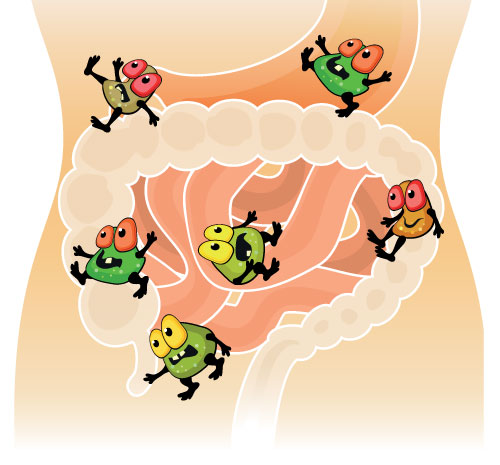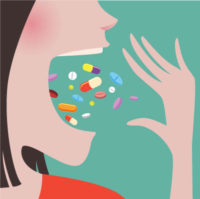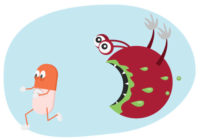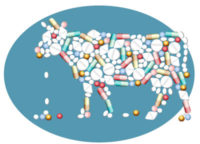Human intestinal microflora (or microbiota) is essential to our health and plays a role in nutrition, development, metabolism, and regulation of immune responses. Antibiotics may disrupt these interactions leading to acute or chronic disease in some individuals.
What Are Antibiotics?
Antibiotics are medicines used to treat infections or diseases caused by bacteria (e.g. urinary tract infections, skin infections and infected wounds). Since it was first introduced, antibiotics have saved millions of lives around the globe. However, because they have been overused or misused, many antibiotics today are no longer effective against the bacteria they once killed.
Gut: The Epicentre Of Antibiotic Resistance
More than 100 trillion microorganisms inhabit our intestines which are made up of about 1000 different species. They interact and perform various functions which help influence human well-being. Gut bacteria predominantly aid in nutrient and drug metabolism, prevention of colonization of pathogenic microorganisms and intestinal barrier function.
Disruption to the gut microflora, on the other hand, has been linked to gastrointestinal conditions such as inflammatory bowel disease and obesity. Some studies have also linked imbalances in the gut microflora to mental health problems and other neurological disorders.
Antibiotics – especially broad-spectrum antibiotics – are very effective at killing bacteria and work quickly against infection, with relatively few side effects. The downside, however, is that they kill indiscriminately and target both harmful and beneficial bacteria in the gut. This allows those few bacteria which are resistant to multiply and repopulate the gut ecosystem.
Another concern is the possibility of selection of antibiotic-resistant strains of bacteria; not only in those which the antibiotic is directed towards but also among the normal bacteria. Our gut microflora could thereby potentially serve as a reservoir of resistance genes and contribute towards the evolution of antibiotic resistance.
Antibiotic Overuse/Misuse
Bacteria which have become resistant to antibiotics threaten our ability to treat common infectious diseases. This may, in turn, result in prolonged illness, disability, and possibly, death.
The World Health Organisation (WHO) describes antibiotic resistance (ABR) as “a serious threat to global public health”. However, despite increased awareness of ABR, overuse still occurs for a number of reasons:
- Doctors may prescribe antibiotics before receiving test results that identify the actual cause of infection (e.g. bacterial, fungal, or viral).
- People who want quick relief from symptoms, regardless of the cause of illness, may pressure doctors for antibiotics.
- People may take antibiotics purchased abroad or via the internet for self-diagnosed illnesses.
- People may take antibiotics that are leftovers from a previous prescription.
- People do not complete their full course of prescribed antibiotics.
- Exposure to animal produce treated with antibiotics.
How Do Bacteria Become Resistant?
Having been exposed to antibiotics over time, some bacteria evolve, mutate or change in certain ways that make them invulnerable to antibiotics. They have developed various ways to defeat antibiotics such as:
- producing enzymes capable of destroying antibiotics
- changing their ‘appearance’ to become unrecognisable to antibiotics
- altering their body in such a way that prevents antibiotics from entering them.
How Does Antibiotic Use In Livestock/Agriculture Affect You & Your Child?
Giving antibiotics to animals helps kill many bacteria and keeps the animal healthy, but resistant bacteria can still survive and multiply. When livestock are processed for human consumption, these bacteria can contaminate the meat or other animal products. Resistant bacteria can also get into the environment through faeces and contaminate the water near these animals.
People get infections by:
- Handling or eating raw/undercooked food from animals or produce contaminated with resistant bacteria.
- From direct or indirect contact with animal stool (e.g. through eating vegetables fertilised with untreated animal dung).
- From handling animals/livestock/agricultural produce.
Preventing Bacterial Resistance
As parents, and as patients, we can do our part to prevent ABR by:
- practicing good hand hygiene, and thus preventing from getting infected by bacteria.
- not asking for antibiotics if the doctor does not think it is necessary.
- asking if tests are necessary to make sure the right antibiotic is prescribed.
- complete the prescribed course of treatment, even when you start feeling better.
- not sharing or using leftover antibiotics.
- discard any leftover antibiotics once the prescribed course of treatment is completed.
An educational contribution by Malaysian Paediatric Association.











Comments